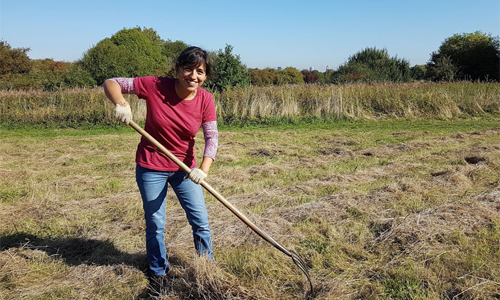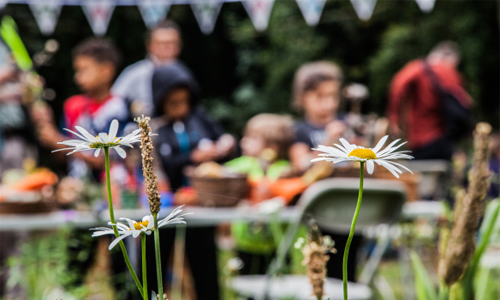On Tuesday 18th February, the Sutton Nature Conservation Volunteers started the day off at Avenue Primary School Nature Area.
Avenue Primary School Nature Area is a small chalk grassland site hidden within the school grounds. This site is very important to the borough, however, as it is home to the Small Blue butterfly (Cupido minimus), which is only found at three other conservation areas in Sutton.
The Small Blue is the UK’s smallest butterfly and is characterised by its brown with blue flecks colouration. It has also becoming increasingly scarce, as much of its habitat has been lost over the recent years. The Small Blue is almost entirely reliant on Kidney Vetch (Anthyllis vulneraria), a small plant characteristic of chalk grassland. Kidney Vetch is the only plant Small Blue caterpillars feed off and as a result, this butterfly is restricted to small pockets of chalk and limestone grassland where Kidney Vetch grows.
Avenue Primary School has a good range of typical chalk-loving plants including: Kidney vetch (Anthyllis vulneraria), Horseshoe vetch (Hippocrepis comosa) and Salad burnet (Sanguisorba minor), which make it an ideal habitat for the Small Blue. Scrapes have also been dug into the chalky soil to create a greater variety of sparse vegetation patches that provide breeding, feeding and warm basking areas that the Small Blue needs. To keep this chalk grassland site in good shape, the volunteers had the task of removing some of the overgrown patches of bramble, to stop it from taking over the grassland.
Avenue Primary School Nature Area also has a shady wooded area, where ash and sycamore grow. This area is also home to a rather undesirable plant – Russian vine (Fallopia baldschianica), which needed to be removed.
Russian vine is a climbing plant that grows over trees, hedges and neglected building. This perennial climber is not native to Europe, but originates all the way from western China and Tibet. It was originally introduced into Europe as an ornamental plant because of its attractive white flowers but like many undesirable non-native species that plague the UK, Russian vine is incredibly fast growing, and is even known as ‘Mile-a-minute’, as they can grow up to 13 feet a year!
The Russian vine at Avenue Primary School had grown to such an extent that it was almost completely blocking the light out from the small pond underneath, as well as smothering the tree it was growing on. Sunlight is vital for pond wildlife, as it helps to keep aquatic plants growing and producing oxygen so that the water doesn’t become stagnant and murky. If a pond becomes too shady, it can prevent plants from growing, as well as making the area around the pond much cooler and less desirable to amphibians.
Volunteers swiftly got to work removing the tangled web of vines, which proved to be exhausting work! However, with many hands on board, most of the vine was quickly removed and sunlight was finally able to reach the pond. This sunlight will help keep the pond healthy for the plants and animals that live there, and ensure that the pond is in great shape for the newts and frogs that will be emerging from hibernation soon.
For a tiny site, the Avenue demonstrates what a bit of awareness for nature can provide in habitat and species, which many people could look to achieve in their own gardens, school grounds or open spaces.
Eleanor Kirby-Green
SNCV Biodiversity Assistant









